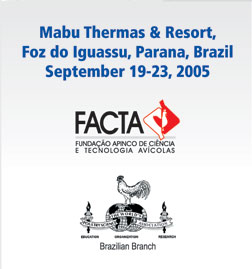DNA Microarray
Gene Expression Analyses in Attenuated and Virulent
E. tenella
T. Mikuš1, M. Poplštein1,
L. Šigutová1,
A. Ivens2, Z. Houdek1, J. Mucksová1, P. Trefil1,
and P. Bedrník1
1 BIOPHARM, Research Institute of Biopharmacy
and
Veterinary Drugs, a.s., Jilove near Prague, Czech
Republic
2 Pathogen Microarrays Group, Wellcome Trust Sanger
Institute, Hinxton CB10 1SA, United Kingdom
Eimeria tenella
is one of the most pathogenic coccidian species of
domestic poultry. Interactions of this parasite with
the host cells and/or host immune system are predominantly
mediated through membrane structures or secreted proteins.
Abundant proteins synthesised during critical periods
of the infection process could be potential vaccine
candidates or important factors of pathogenicity.
We have used microarrays, comprising 2,700 long oligos
designed from the currently available EST/ORESTES
dataset, to study differential transcriptional activity
in a subset of the developmental stages of E. tenella.
Several developmentally regulated genes were identified.
Interestingly, virulent and attenuated E. tenella
(strain M 98 and the embryo-adapted line CH-E-A, respectively)
appeared to exhibit differing profiles of gene expression
in some developmental stages. Changes in gene expression
induced upon interaction with epithelial cells (MDBK
cells or primary chicken kidney cells) were also analysed.
The differential transcriptional activities of the
selected developmentally regulated candidate genes
in both the virulent and attenuated strains were confirmed
using Northern blot analyses. We are thus confident
the resources we have developed provide a useful tool
for the study of differential gene expression in Eimeria.
Corresponding
author:
RNDr. Tomáš
Mikuš, Ph.D
BIOPHARM, Research Institute of Biopharmacy and Veterinary
Drugs, a.s
Jilové near Prague
254 49
Czech Republic
Tel. +420
2 613 95 230
Fax +420 2 419 50 503
Email tomas.mikus@bri.cz
